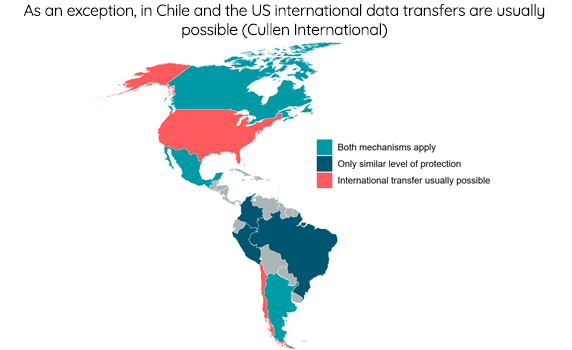Cullen International has published new research on the rules for data transfers applicable in Argentina, Brazil, Canada, Chile, Colombia, Mexico, Peru and the USA, including:
- obligations to store data within the country; and
- restrictions on the transfer of data to third countries, such as requiring a similar level of personal data protection.
The research also examines whether and how multilateral arrangements facilitate international data transfers, including those established by the Asia-Pacific Economic Cooperation (APEC), the United States-Mexico-Canada Agreement (USMCA), and the European Union.
In Argentina, Canada and Mexico, personal data can be transferred to foreign countries that offer a similar level of protection to personal data or that are party to specific international schemes.
Brazil, Colombia and Peru only accept a similar level of protection to authorise international data transfers. International data transfers are usually possible from the USA and Chile, since these countries do not impose specific restrictions.

For more information or to access the full benchmark, please click on “Access the full content” - or on “Request Access”, in case you are not subscribed to our Americas Digital Economy service.
more news
16 January 26
Cullen Digital Networks Act (DNA) Hub: 11 key takeaways from the leaked draft
The preliminary observations in this report are based on a leaked version of the draft Digital Networks Act (DNA), still subject to change, seen by Cullen International. A more comprehensive analysis will follow once the European Commission has published the final version on 20 January 2026.
12 January 26
Is IoT regulation continuing to intensify globally?
Our Quarterly Regulatory Update on IoT and M2M Services (Q4 2025) highlights how national regulators are shaping the future of IoT and M2M services in areas such as cross-border connectivity, device regulation, and security.
08 January 26
Video gaming: EU regulatory and competition law implications across the value chain
Cullen International’s special report published in December 2025 explores the gaming value chain, with a focus on the application of regulation and competition law in the EU.